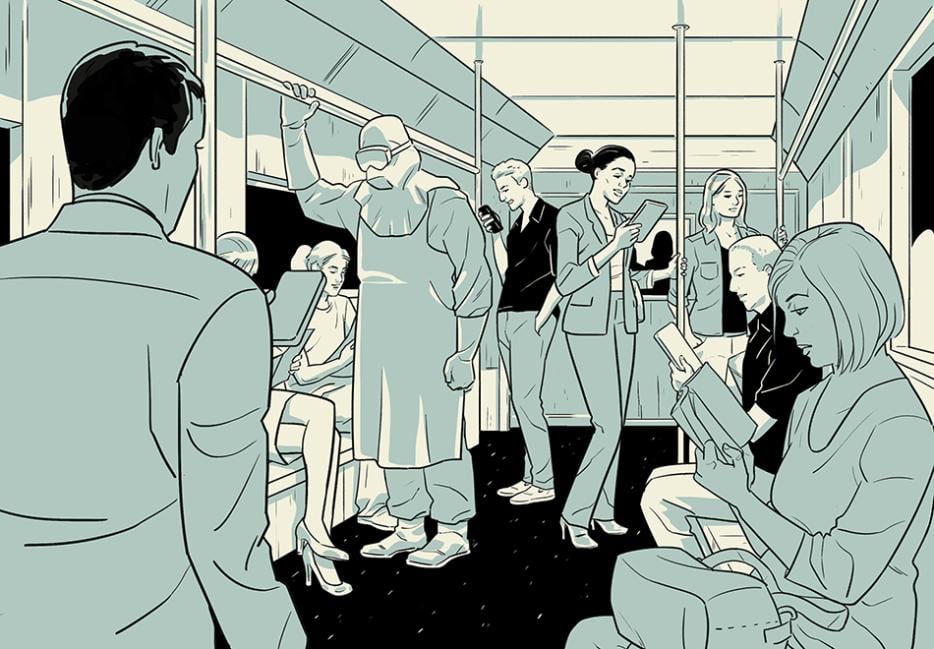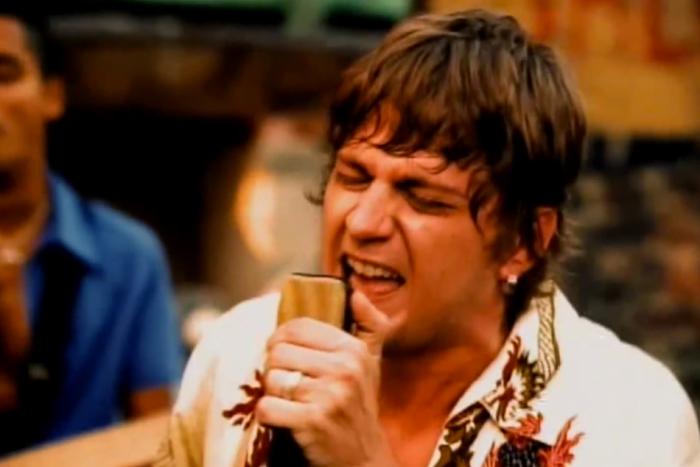In March of last year, a nightmare quietly spilled out of the forest and a child died. Those who mourned at that child’s funeral started to fall ill and die themselves. Then their families began to die. This is how an Ebola outbreak starts: not with screaming sensationalist reporting and desperate pleas for action, but in the tears of loss and the tender goodbyes where human touch is forbidden. A child plays in a hollow tree and brings home a killer. A mother loses a son and Ebola gains a foothold.
By June 23, 2014, this Ebola outbreak had become the worst emergence of the virus on record, chalking up over 350 deaths with staggering ease and at a terrifying pace. The virus quickly spread through Sierra Leone, Guinea, and Liberia, and then internationally. Where once we watched from afar as this alien creature writhed and spit and fought its containment, this time, those of us at cushioned distance felt the smallness of our world as Ebola slipped its shackles and began creeping onto planes and across oceans.
The privilege of watching-but-not-caring washed out in the stormy deluge of a surging caseload and Ebola transmissions appearing outside the make-believe borders that had previously held it at bay. People panicked. In October, when Thomas Eric Duncan became the first person to be diagnosed with Ebola in the United States, there were reports of travellers around the country showing up at airports in full personal protective equipment (PPE): Tyvex suit, face mask, gloves, little paper booties—the black tie of infectious disease prevention.
This was, of course, a hysterical overreaction to the unspeakable tragedy that befell Duncan. He’d contracted Ebola by helping a sick, pregnant woman in his home country of Liberia, right before coming to the United States to reunite with his fiancé, the mother of his child, whom he had not seen in 16 years. But when news choppers snapped a picture of a worker hosing Duncan’s Ebola-riddled vomit off the sidewalk in nothing but tan slacks and tennis shoes, the public was unsettled. When the goddamn CDC itself had insufficient PPE guidelines on its website, and nurses covered their necks with tape to protect their skin, things got scary. As the disease continued spreading with no mind to our anxieties, it seemed as if every news organization was heralding doom, desperate sirens from the rocks. It was hard to see the real risks through the fear.
We are not so afraid anymore. I no longer field worried questions from friends, no longer hear strangers speak those three syllables in strained, nervous tones, no longer have to endure the cruel, selfish remarks of bloated public figures who crow punishment for the medical heroes in the trenches who dare return home to their beds. When ice-water panic flooded the narcissistic, wealthy West, Ebola was all anyone wanted to talk about—when, for a brief, terrible instant, it appeared that Ebola was poised to become everybody’s problem.
But it didn’t.
Just this past week, the number of new cases of Ebola increased in Sierra Leone, Guinea, and Liberia for the first time in 2015. In the same report, the WHO warns that Ebola response “still faces significant challenges.” Not to mention, the wet season is approaching, which will make travel within regions affected by the outbreak all the more treacherous.
And the West has stopped caring.
When I talk to my children about watching or reading the news, I always mention the story of the boy who cried wolf. Signalling danger to others is one of the fastest routes to attention, and we are certainly an attention-based economy. (It’s one of the reasons girls are taught to shout “fire” instead of “rape.”) Shriek down from the platform of legitimacy and find your audience; instill a baseline level of fear, and watch people line up with trembling hands for the chance to beat the foe du jour before their neighbours smell your terror themselves.
But, repeated enough, even horror becomes boring. This isn’t necessarily the kind of apathy borne of malice, but of comfort, routine—the shout of “wolf!” turning into an empty threat. The problem here, however, is that the wolf is real, and it’s busy as hell—it’s just that the threatened sheep aren’t our own.
*
Today, there have been nearly 23,000 confirmed cases of Ebola connected to this outbreak. It has killed almost 9,000 people. Liberia, a country of 4.8 million people, lost almost 10 percent of its doctors—though it only had about 50 to begin with. Transmission continues, workers are exhausted, and life struggles onward.
Schools in Sierra Leone have been closed since July, tentatively scheduled to re-open in March. Little fingers in need of pricking go untested for malaria, and people are dying from treatable diseases. Vaccination campaigns are struggling, and childhood vaccination rates are plummeting. Pregnant women face a double threat, with fewer places to seek obstetrical care and a 95 percent mortality rate from the virus. Survivors are shunned. Over 11,000 children have lost one or both parents. Quarantines through the region have led to food becoming scarce: supplies aren’t getting delivered to outbreak areas, and farming has been disrupted. People are starving.
Despite recent optimistic news to the contrary, just this past week, the number of new cases of Ebola increased in Sierra Leone, Guinea, and Liberia for the first time in 2015. In the same report, the WHO warns that Ebola response “still faces significant challenges.” Not to mention, the wet season is approaching, which will make travel within regions affected by the outbreak all the more treacherous.
And the West has stopped caring.
When Ebola transmission occurred on North American soil, the media—already whipped into a determined, predictive frenzy—lost their minds, gnashing their teeth and blindly tearing into the darkest parts of our psyches like modern-day berserkers, claws deep into the space of childhood boogeymen long ago replaced by monsters that hide in plain sight. Before, Ebola was a Hollywood disease, scaring the daylights out of a population used to the salvation of distance. But now, Ebola became a reality to those conditioned to treat it like the Platonic ideal of the apocalypse. It didn’t matter that across an ocean there were families blinking out of existence, that Ebola is spread by the kind of intimate contact a desperate mother makes with her sick child, that access to disposable barrier protection and bleach was only a quick trip to the store away for those in the privileged West. What mattered was that the nightmare was now only a plane ride away; what mattered was that we, in the land of plenty, felt the tiniest fraction of the fear that permeates the very air inside the outbreak. But then something unexpected started happening: sick healthcare workers began walking, healthy, out of U.S. hospitals.
Left unextinguished, Ebola runs the risk of becoming something else entirely: endemic. Entrenched in these areas, staying stubbornly active in the community, Ebola would be another disease to guard against at all times. We’d learn to live with it. There’s precedent here: Humans lived with fatal rabies frothing at their collective doorstep for hundreds of years before figuring out how to tame it.
At first, the survivors felt precious, stolen back from the very clutches of death that had gripped them with such fervor. When Dr. Kenneth Brantly sat across from Matt Lauer for his post-Ebola interview, the two of them cozy in the Grove Park Inn (a beautiful hotel famed for being a fresh-air refuge to celebrities of the Roaring Twenties like F. Scott and Zelda), the survivor looked drained, thin, and explicitly lucky. When Nina Pham, a nurse who contracted Ebola inside the Texas hospital where Duncan died, was photographed collecting a hug from President Obama, it felt joyous and unlikely, like we’d dodged an asteroid. But that feeling has been fading ever since—not back into fear, but into nothingness.
Today, Thomas Eric Duncan remains the only person to have died from Ebola in the United States. All the people flown out of hell and into the most capable hospitals, all of them—all of them—survived. And we were in turn given implied permission to stop caring. The political capital was spent; the midterm elections were over. The boy who cried wolf was again left alone with his flock.
*
While the end of the outbreak is potentially in sight, reaching such a conclusion will not be easy. It was no exaggeration when the outgoing head of the UN Mission for Ebola Emergency Response, Anthony Banbury, called what lies between the end of 2014 and the optimistic end of the outbreak—that is, the end of 2015—an “epic battle.” The risks of apathy are simply too high. Ebola will not smother itself if we merely wait on the periphery. After a few weeks of decelerating transmission rates, the spike in new cases has demonstrated this anew. There is no world where Ebola simply runs its course and comes to an end without us forcibly stopping it.
“We described this in the past as a forest fire,” said Dr. Tom Frieden, director of the Atlanta-based Centers for Disease Control and Prevention, during a tele-briefing after touring the countries hit hardest by the epidemic: Guinea, Liberia, and Sierra Leone. “The team said it's not really so much a forest fire as it is a country with many, many brush fires. Each of those brush fires needs to be put out by rapid and sensitive outreach.” The image of Ebola as a collection of blazes springing from the sparking ashes of abandoned campsites is perhaps more unsettling than that of a single, roaring inferno. Viruses like Ebola, after all, want to be ignored—left alone so that they may blossom into forces of destruction that stun with their efficacy.
Left unextinguished, Ebola runs the risk of becoming something else entirely: endemic. Entrenched in these areas, staying stubbornly active in the community, Ebola would be another disease to guard against at all times. We’d learn to live with it. There’s precedent here: Humans lived with fatal rabies frothing at their collective doorstep for hundreds of years before figuring out how to tame it.
“Going forward, the challenge is to get to zero, because until we get to zero in these countries, they won't be able to fully move on rebuilding their health care system and making sure, as a society, they can get back to work and back to making progress,” said Dr. Frieden in his post-trip briefing, underscoring the dangers of the close-enough mentality. “Until they get to zero, we in the U.S. will not be safe from other potential imported cases. Until they get to zero, we can't be sure that the disease won't spread to other countries and potentially develop more challenging patterns. We have already seen how difficult it is, especially in urban areas, to stop Ebola, and until we get to zero, we won't know that we have been able to do that.”
There are so many instances of suffering that go unchecked around the world, allowed to ride through vulnerable populations, unimpeded by the affluent countries with resources to halt them. We turn a blind eye to starvation, easily preventable infectious diseases, those in need of clean water, and the 80 percent of the world that lives on less than $10 a day. It’s hard to stomach. “How can this happen?” is the chorus, and this is how. Call it “caring fatigue,” call it narcissism, call it apathy: in the attention economy, real but difficult-to-comprehend horror can slip effortlessly away. Horror’s true gift is that its absence is welcomed by those tired of watching it.
On Sunday, February 8, Hazlitt presents The Borderless Plague: A Conversation about Ebola and its Global Ramifications, featuring Dr. James Maskalyk, Medecins Sans Frontieres (MSF) and author of Six Months in Sudan, and Dr. James Orbinski, former president of Medecins Sans Frontieres (MSF), bestselling author of An Imperfect Offering, moderated by Carol Off, host of CBC Radio’s “As It Happens” at the Bram and Bluma Appel Salon at the Toronto Reference Library.






